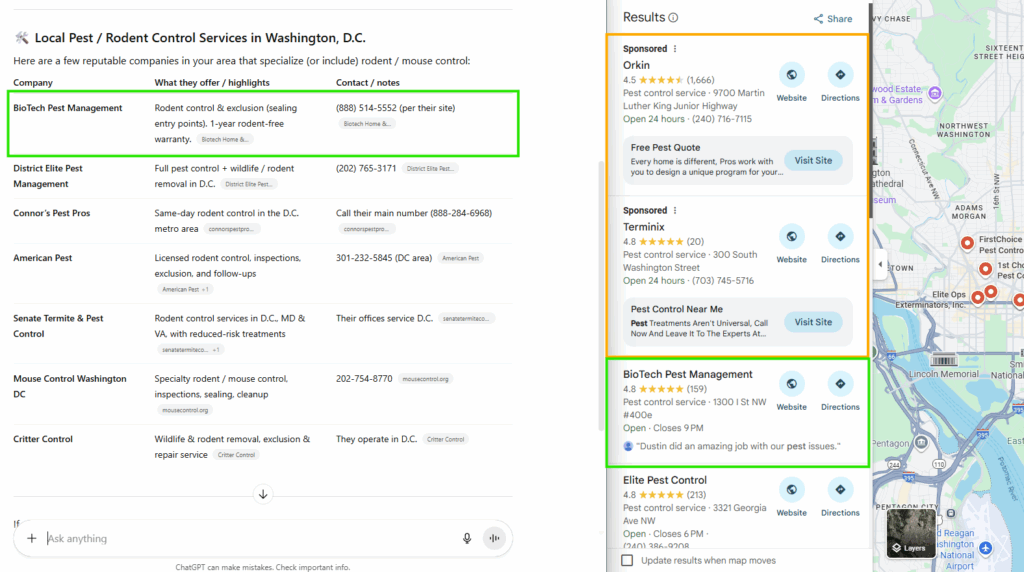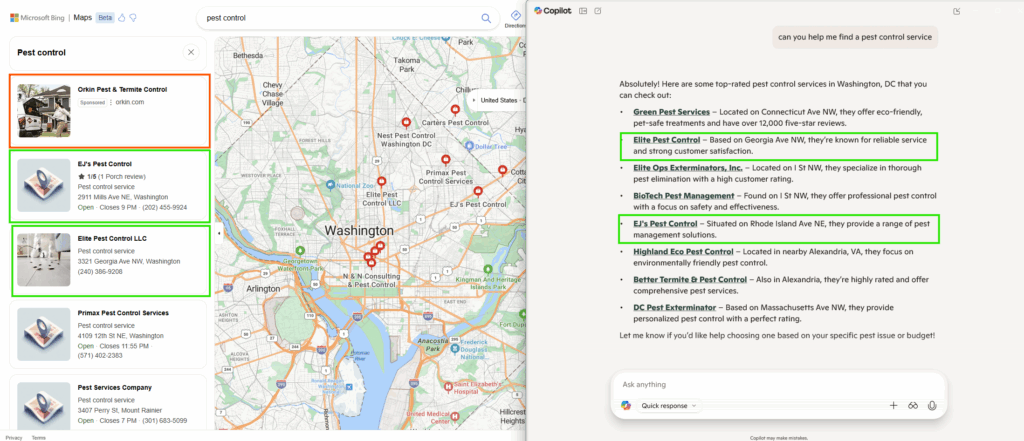The Big Picture
- AI assistants are changing discovery. Chat-based tools like ChatGPT, Perplexity, Google’s AI Overviews, and Microsoft Copilot are surfacing local businesses based on data — not ads.
- Proximity now outranks ad spend. Early tests show AI systems favor verified, nearby businesses pulled from Google Business Profile and Bing Places.
- Two listings, one strategy. Together, Google Business Profile and Bing Places form the new foundation of visibility in both traditional search and AI-powered recommendations.
If you run a home service business, you’ve probably invested time (and money) making sure your company shows up in search. For years, that meant focusing on Google search ads, SEO, and your Google Business Profile.
But AI is changing how homeowners find help — and it’s not paying attention to your sponsored listings.
The Shift: AI Isn’t Looking at Ads
When homeowners turn to AI assistants and chat-based search — whether it’s ChatGPT, Perplexity, Google’s AI Overviews, or Microsoft Copilot — they don’t see the same paid placements that dominate traditional search results.
Instead, early testing from our longitudinal study shows that these AI systems are drawing from verified business data — prioritizing proximity, completeness, and trust signals over ad spend.
That means:
- Sponsored listings don’t matter. None of the major AI tools we tested showed ads in their recommendations.
- Proximity is key. AI models consistently favor businesses closest to the user’s location.
- Business profiles are the source of truth. Structured data from Google Business Profile and Bing Places power these local results.
The result? Smaller, local providers are starting to show up in AI-generated responses right next to (or ahead of) larger, better-known brands — even those that dominate ad space on Google.

Why Business Profiles Are the New SEO Foundation
Search used to be about keywords, links, and paid visibility. AI has changed the rules.
Today’s discovery systems look for trusted, structured business data — and the most reliable sources of that data are your Google Business Profile and Bing Places listings.
That’s how AI knows who you are, what you do, when you’re open, and — most importantly — how close you are to the person asking for help.
If your listings are incomplete, inconsistent, or unverified, AI systems may simply skip over you in favor of a competitor who has clean, structured data.
Bing Places & Copilot: The Early Movers
Microsoft’s Copilot is built on Bing, and it’s leading the way in how AI assistants use local data.
When homeowners ask Copilot for help — “find me a plumber nearby” or “recommend an HVAC company in my area” — it doesn’t show ads or sponsored listings. Instead, it relies on Bing’s local data to make recommendations.
Our research shows that:
- Copilot ignores paid placements entirely.
- Bing Places listings are the primary source for local recommendations.
- Proximity and completeness directly affect visibility.
- Smaller businesses are frequently prioritized over national brands running ad campaigns.
With Copilot integrated directly into Windows 11, and deeper integration coming in Windows 12, this behavior matters more than ever. Millions of homeowners will soon have Copilot built into their devices — and when they ask for help, Bing Places decides who gets recommended.

Google Business Profile: Still the Cornerstone of Discovery
While Bing and Copilot are growing fast, Google still dominates traditional local discovery through Search and Maps.
Your Google Business Profile remains the foundation of:
- Local Pack and map visibility
- Review aggregation
- AI Overviews (Google’s own generative answers in search results)
Together, Google Business Profile and Bing Places form the data backbone of modern AI discovery — two parallel sources feeding both search engines and emerging AI systems.
Why This Is a Big Opportunity
- AI is leveling the field. Ads and big budgets don’t guarantee visibility anymore.
- Structured data wins. Verified business listings are becoming the new ranking signal.
- Proximity drives relevance. If you’re nearby and your information is accurate, AI assistants are more likely to surface your business.
- Future-ready presence. As AI gets built into operating systems and apps, these listings will quietly become your most valuable digital assets.
What You Should Do Next
- Claim or update your Google Business Profile – Setup Guide.
- Claim or update your Bing Places listing
- Ensure consistency. Hours, services, and contact info should match across both platforms.
- Add photos and reviews. AI models treat visual and review data as trust signals.
- Keep them fresh. Update seasonally, especially for service availability and promotions.
The Bottom Line
AI isn’t showing homeowners the same ads and sponsored results they used to see. It’s using proximity, relevance, and verified data from your Google Business Profile and Bing Places to decide who gets recommended.
And that shift is creating opportunity — especially for small and mid-sized service providers who keep their listings accurate, consistent, and complete.
With AI discovery built into search engines and even operating systems, these two profiles are now the foundation of local visibility.
And once customers find you?
👉 Connect your Google and Bing profiles to our AI-powered booking page, so homeowners can instantly schedule with you the moment an AI assistant recommends your business.
